Trudy J. Morgan-Cole's Blog, page 15
November 13, 2023
All Adults Here, by Emma Straub
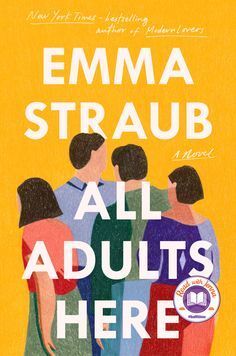
I saw a friend post on Instagram that she’d really loved Emma Straub’s This Time Tomorrow, but hadn’t liked this one as much. My experience was the opposite. Despite the high-concept time-travel element in This Time Tomorrow, which is the sort of thing I normally love, that book was “just OK” for me. All Adults Here, which has no high-concept gimmicks but is a straightforward story of a multigenerational family dealing with changes in their lives from the perspective of several different characters, absolutely grabbed my attention and held it till the last word.
The family in question is Astrid’s family; she is a woman in her 60s whose husband died young and whose three children are all grown. She feels she’s done a pretty good job of her life, of marriage and child-rearing, but when she sees an acquaintance about her own age killed in a traffic accident right in front of her, Astrid understandably starts re-thinking her life and wondering whether she has lived it to the fullest. This results in her making a few significant changes — at a time when her own adult children, and one teenage grandchild, are also going through important choices and changes.
And that’s it, really, plotwise. The traffic accident is the most dramatic thing that happens in the book, and it’s in the first few pages and happens to a character who’s not directly connected to the book’s main cast. The rest of the book is just the stuff of life — relationships starting and ending, a teenager getting into trouble at school, an affair, a pregnancy, a few long-held secrets that tumble out in awkward confrontations. It’s just life, and yet I found it all so rich and interesting. The characters are complex and well-drawn, none wholly good or bad, so that they felt to me like real people.
I’m not normally one to be underlining or annotating books or making little memes out of book quotes, but there were several times in this novel when I just had to stop and note a sentence because it felt so true and insightful — maybe not universal, but certainly something that resonated with me. Here are a few of them:
“So much of becoming an adult was distancing yourself from your childhood experiences and pretending they didn’t matter, then growing to realize they were all that mattered and composed 90% of your entire being.”
“People without children thought that having a newborn was the hardest part of parenthood, that upside-down, day-is-night twilight zone of feedings and toothless wails. But parents knew better. Parents knew that the hardest part of parenthood was figuring out how to do the right thing twenty-four hours a day, forever, and surviving all the times you failed.’
“All love settled. Not settling for something less than you deserved, just settled down, the way breath settles in a sleeping body, not doing more than necessary.”
“Astrid knew that she had failed, maybe not in the ways that she thought she had, but in so many ways she had never even noticed. This was the job of a parent: to f*ck up, over and over again. This was the job of a child: to grow up anyway.”
This last one hit particularly hard: there’s a story from the past that Astrid is carrying throughout the novel, a moment when she failed one of her children and she feels her failure has both thwarted that child’s life, and damaged their relationship. When she finally gets up the courage to speak about it, she discovers that her adult child has indeed been carrying years of hurt and resentment — over a totally different incident when Astrid said the wrong thing. Both parent and child barely remember the incident that was so weighty to the other. As a parent of adult kids I often think about the many ways I’ve messed up, failed, and hurt them — and of course am reminded, as I was by this scene in the book, that sometimes when I’ve done the most harm, I haven’t even realized the significance. And likewise, that the things I carry a lot of guilt over might not even have been that important. A powerful reminder that we all see the world only through our own eyes, and can only guess at what other people might be thinking and feeling.
I really loved this book.
Strong Female Character, by Fern Brady
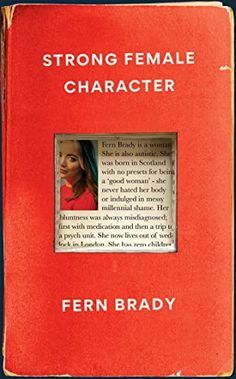
Having seen (and loved) Scottish comedian Fern Brady on Taskmaster, and having read some references to her talking about being autistic and how her autism diagnosis has affected her life and her career, I knew that her memoir, Strong Female Character would not just be a piece of lighthearted fluff full of comedy-business gossip. In fact, it’s not that at all, and the fact that Fern is a brilliant comedian is almost incidental (though the book is very darkly funny in places). Really, this is a searing, sometimes painful look at what it’s like to go through childhood, adolescence, and young adulthood knowing that something is wrong with you, but being unable to understand what it is and consequently being misunderstood and mistreated by everyone, including family. Fern doesn’t get diagnosed with autism until she’s an adult already working in the entertainment industry, and she’s brutally honest about the difficulties of school, family life, the mental-health-care system, university, and work (including sex work; she put herself through university partly by working as a stripper) with undiagnosed autism.
Nor is there any sudden revelation and happy ending when she is diagnosed: the same frankness that has characterized the whole story continues post-diagnosis, when Fern finally has a label for her differences and some tools to deal with them, but still has to cope with a world and an industry that is in no way set up to make reasonable accommodations for autistic people. If you’re autistic or suspect you may be, I think you would find this interesting and probably relatable; if, like me, you’re not, it may help you to better understand some of the autistic people in your life and what accommodations they might require. Also — and this is a trivial point in such a serious book, but it was part of my reading experience — if you like Scots accents, do yourself a favour and listen to the author reading the book on audio. I highly recommend this book!
November 12, 2023
The Last Devil to Die, by Richard Osman
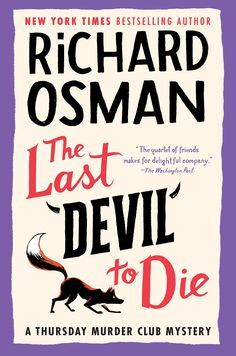
Once again, the latest volume in the Thursday Murder Club series provides everything we’ve come to expect from the earlier volumes: sassy senior citizens taking advantage of the fact that nobody takes them seriously as crime-solvers, a nicely twisty plot which carries on some of the story threads from the previous novels.
Along with the sly humour of this series, there’s always been a little bittersweetness to the main characters’ stories. We know that Elizabeth, Joyce, Ron and Ibrahim are smart, capable people who shouldn’t be written off just because they live in a retirement community, but the awareness that they are getting older, accepting physical limitations and the fact that they don’t have endless years stretching ahead of them, is always in the background of the stories. Here it’s much more at the forefront, as a heart-rending plot twist involving a secondary character ties in neatly to the mystery plot, but also reminds us that it’s not just the devils who die … sometimes the good guys do too.
November 11, 2023
Doppelganger, by Naomi Klein
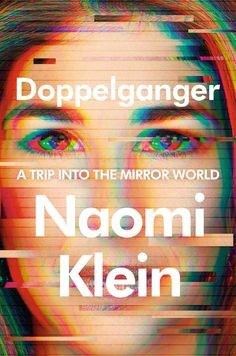
I’ll admit it; I’m one of those people who used to get Naomi Klein and Naomi Wolf mixed up. Possibly because I’d never actually read a book by either of them. Klein’s The Shock Doctrine and No Logo, and Wolf’s The Beauty Myth, were all books that existed in the same vague space in my brain: books about important things by smart women, that I probably should get around to reading someday. The fact that both women were named Naomi made it even harder to differentiate.
And yes, I’ll further admit to the fact that once the confusion between the two became ultra-confusing — when Naomi Wolf began to lean hard into anti-vax conspiracy theories and covid denailism — I, like many other Extremely Online folks, began making use of the handy little memory device invented by a Twitter user:

(Interesting to note that this was written before Covid; Naomi Wolf’s views had apparently become problematic for Naomi Klein and her fans even then, but Wolf’s slide into conspiracy theories and embrace of right-wing views did not enter most people’s consciousness until 2020).
Rather than trying to ignore or avoid confusions between herself and Wolf, as she did for many years, Naomi Klein has tackled the confusion head-on in her new book Doppelganger. She uses the confusion between herself and Wolf, the initial similarity and later sharp divergence of their personal “brands,” as a jumping-off place to explore right-wing conspiracy thinking and the way in which it often mirrors the shared left-wing views of Klein and most of her readers.
As someone who’s much more aligned with Klein than Wolf (now that I know the difference between them), I found a lot of thought-provoking ideas in this book. There’s a chapter near the end about Israel and Palestine, and I was listening to that part of the audiobook just as the current conflict flared up. It may seem a long way from Klein vs Wolf to Israel vs Palestine, but her exploration of the way “mirroring” or “doppelganger” affects show up in the Israel/Palestine conflict was very interesting, especially from Klein’s perspective as a secular Jewish leftist. This book is well worth reading, or listening to as I did.
November 10, 2023
Black Harbour, by Xaiver Michael Campbell and Heather Barrett
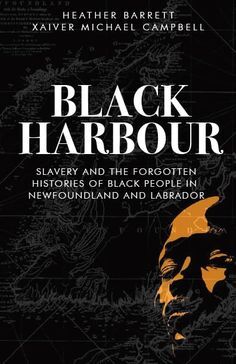
This local book, subtitled “Slavery and the Forgotten Histories of Black People in Newfoundland and Labrador,” made a great companion volume to The Black Tudors, the last book I reviewed. Co-authors Xaiver Michael Campbell and Heather Barrett are engaged in a similar, though less in-depth, project to Kaufmann’s, in that they take the scant records of Black people, enslaved or otherwise, in Newfoundland between from about 1600 to the late 1800s, and try to put these references in context of what we know about life and culture at the time. Like Kaufmann, Campbell and Barrett (and the historians they interviewed for the project) believe that these scant traces indicate the unrecorded presence of many more Black people than we usually imagine as part of Newfoundland history — and also that many, if not most, of these people were enslaved.
Campbell and Barrett are not professional historians, though they draw upon the work of historians, and this is much more than a work of popular history like The Black Tudors. It also has elements of memoir, with Barrett, as a white person born in Newfoundland, reflecting on the pervasive whiteness of Newfoundland history and culture, and the unseen presence of Black people within that history. Campbell, as a Black Jamaican who makes his home in Newfoundland today, reflects on these same connections from a different perspective, as well as on the persistent othering of being not just a “come from away,” but a come from away whose difference is evident in his skin colour, within our supposedly welcoming culture.
A thread woven throughout these more reflective, memoir-like chapters (which are interspersed among the more directly historical parts of the books) is the place of food in this history. Both authors write about salt fish, molasses, “screech,” all foods that link Newfoundland and Jamaica. But rather than the narrative I’ve known for years (“Isn’t it interesting we share all these foods in common with the Caribbean islands; Newfoundland sailors and fishermen travelled there and we traded with those islands!”) the authors encourage readers, especially Newfoundlanders of British descent like me, to probe deeper into the reasons why those connections exist, the more sinister links. Newfoundland and Jamaica don’t just happen to be two islands where people like to eat salt fish and have made it central to their food culture; Newfoundland fishermen made their living catching and processing salt fish, the cheapest kind of which (“Jamaica grade”) was sold to the Caribbean as an inexpensive source of protein to keep enslaved people fed just enough to continue working.
Black Harbour urges us not to avert our eyes from these and other connections between Newfoundland history and the history of the slave trade, the enslavement of Black people, whether directly here on this land or in other places where Newfoundlanders’ labour directly or indirectly supported that trade. As a writer of historical fiction, I picked up this book (much as I did The Black Tudors) because I was interested in whether Black settlers might have been part of the population here in the early 17th century. However, reading it challenged me as a white settler-descended Newfoundlander, to think about the pieces of our history we don’t tell, and what we learn when we confront those unspoken stories. This book is short and deceptively light, but it packs a lot into its few pages and I highly recommend it.
The Black Tudors, by Miranda Kauffmann
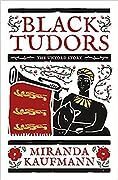
The Black Tudors is an interesting piece of social history that follows the common approach for this type of book: piecing together the little bit we know from historical records about the lives of a few people, then extrapolating what their lives might have been like from what we know of similar people and experiences at the time. Using this method, UK historian and journalist tries to flesh out the lives of the handful of Black people whose names appear in English historical records during the Tudor period.
Her thesis is that, first, there were more Black people living in Britain at that period than commonly assumed, and second, that their lives and experiences were more diverse than we might expect. While some were enslaved, many, at that period, were not (the English were only just starting to explore the slave trade by the end of the Tudor period, and would not get into enslaving and selling human chattel in a big way until the following century). Many, even if not technically enslaved, were servants, but some were independent, with a handful of artisans even owning their own small business enterprises and property. Some appear in the records because, though born in largely Muslim North African countries, they converted to Christianity in England. Some married their white English neighbours. Some prospered; some lived in poverty. And, Kaufmann points out, the fact that these few Black people appear by name in public records, suggests that many more people of African origin lived in Tudor England — many more who, like the vast majority of poor people of all races, left no trace in official records.
I found this an interesting audiobook to listen to; it was useful in correcting the all-white impression we often have of England (and Europe more generally) in the pre-modern era.
October 22, 2023
How to Build a Boat, by Elaine Feeney

This Booker-prize-longlisted Irish novel tells a small, poignant story of a neurodivergent 13-year-old boy and two teachers who make a difference in his life simply by accepting him as he is. Jamie is the main character and is an engaging first-person narrator for some sections of the book. I always wonder when a writer recreates the thoughts of an autistic young person (as in this book or in one like The Curious Incident of the Dog in the Night-Time) whether what they’re recreating would feel authentic to the experience of someone on the autism spectrum. That’s not a question I can answer, although I’m interested in what people on that spectrum would think of Jamie’s portrayal in this book. All I can say as a reader is that I believed in Jamie as a character; his actions make perfect sense in the context of how he thinks, even if they don’t always to people around him, and for me his attempts to carve out space in the difficult world of adolescence, and to process his grief over the mother he never knew, were the heart of the story.
I also liked the stories of the two teachers, Tess and Tadhg, people both stuck in their own lives and grieving their own losses, but able to reach out to a young person in need — as well as to each other. The project of building Jamie’s boat — begun in Tadhg’s woodworking classroom — turns into a little community that encompasses not just Tess, Tadhg, and Jamie, but a small group of other students, as well as Jamie’s loving but often overwhelmed father and grandmother. I found this a heartwarming-without-being-sentimental story that is ultimately about community and accepting other people for who they are.
October 18, 2023
Much Ado About Nada, by Uzma Jalaluddin
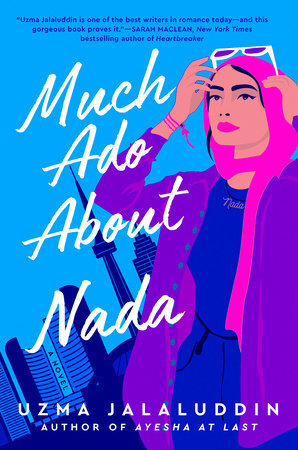
Uzma Jalaluddin is one of those writers that I can always rely on for an enjoyable, feel-good romance with enough distinctive flavouring to make it interesting (since I find some romances quite bland). Once again, as with her first two novels, Jalaluddin introduces us to a twenty-something Muslim woman living in Toronto. And once again, while the novel is not as faithful a tribute to Jane Austen as Ayesha at Last was, there are strong echoes of an Austen plot here: in this case, Persuasion.
Nada has a secret, and she’s kept it from her friends and family for a long time. But when her best friend Haleema drags Nada off to a big Muslim convention in downtown Toronto, Nada’s afraid her secret may come out. Haleema’s just gotten engaged to wealthy heart-throb Zayn, and Zayn’s brother Baz is … well, he’s someone Nada’s been hoping not to run into. The story is told in chapters that alternate between the present day and flashbacks to Nada’s past, and it’s a very satisfying journey.
October 15, 2023
The Witch Elm, by Tana French

I found The Witch Elm very easy to get into and very hard to put down, but also hard to categorize. Tana French is a mystery writer, and the only other book of hers I’ve read, The Secret Place, is definitely a mystery. There’s a mysterious death and an effort to figure out who done it in The Witch Elm too, but the story isn’t structured like a typical mystery novel; maybe I’d call it a psychological thriller, with more emphasis on the psychology and less on the thrills. I’ve seen many reader reviews online complaining that the book is too slow-paced, but I personally enjoyed the pace as it gave plenty of time to build up my knowledge of the characters, who they are and what motivates them, and that knowledge is crucial to appreciating the mystery that unfolds in the second half of the book.
The novel’s main character is Toby, a young man in his late 20s living in present-day Dublin. Toby’s pretty much got it made: he’s well-off, well-educated, has a supportive family behind him, a good job, and a lovely girlfriend. He’s never had to work too hard for anything and admits to himself that he’s always been lucky. Suddenly his luck changes: a seemingly random break-in at his flat leads to a brutal assault which leaves Toby with significant injuries and a long recovery ahead of him.
Not being able to bounce back effortlessly from this incident — having to re-orient his idea of himself to accommodate his new disabilities — bothers Toby even more than the attack itself, although that bothers him too: was it really random, or was he targeted for some reason? In the middle of his recovery, still unable to go back to work or cope with everyday life, he moves into the old family home to help care for an uncle who is dying of a brain tumour. It’s there, in Ivy House, that a shocking discovery (well, I’m not going to be coy because it’s in every blurb of the book: they find a relatively recent human skull in the titular elm tree in the garden) makes Toby re-examine everything he thinks he knows about himself, his past, and the people closest to him.
Toby’s unquestioning approach to his own privilege shows up most starkly in his relationship with his two same-age cousins, Samantha and Leon. While they both share Toby’s well-off family background and other advangages, Samantha as a woman and Leon as a gay man have had to encounter barriers that Toby not only never faced, he’s never even been aware of. When they share their recollections of a school acquaintance that Toby remembers as a pretty decent guy, it turns out that both Samantha and Leon have much darker memories of their encounters with this boy, which in turn leads Toby to question his own judgement not just of this old school friend but also of himself as “a good guy.” In the end, Toby will question everything about who he is and the life he’s lucked into. There’s no guarantee of a comforting ending here, but I found the journey fascinating.
October 9, 2023
Back in the Land of the Living, by Eva Crocker
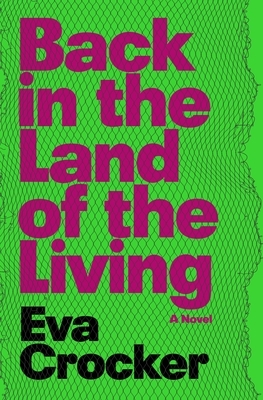
Eva Crocker follows up her highly successful debut novel, All I Ask, with another story of a young queer woman from Newfoundland who is trying to figure out her direction in life. In this novel, Marcy Pike moves from St. John’s to Montreal after a breakup with her girlfriend and tries to support herself with a series of unpromising jobs while looking for love.
Marcy isn’t the same character as Stacey from All I Ask, but they are very similar types of characters, and the aimlessness and near-despair Marcy feels about both her present and her future is familiar. As the story’s calendar moves through 2019 and into early 2020, the character I identified most with was Marcy’s mom, who appears only via phone calls, and urges her daughter to come back to Newfoundland before Covid regulations close down interprovincial travel. Marcy’s mom is incredulous as to why her daughter would rather ride out lockdown in a Covid-riddled large city rather than safely in the island bubble where she has friends and family; I would have had the exact same reaction if either of my kids had been on the mainland at the time and determined to stay there. When Marcy’s response to her mother is “I have a life here,” as a mom-generation reader I couldn’t help mentally asking, “But do you really, honey?” having just read pages and pages about Marcy’s unhappy relationship and dead-end jobs.
That’s a note on the content (very much related to my “why are all the young people so unhappy, or is it just the writers” comment on Casey Plett’s Little Fish, a book that gets a passing mention in this book as a character is reading a copy of it). But that doesn’t touch on the main thing that Back in the Land of the Living does well, which is the kind of evocative, incisive descriptions that bring a moment or a scene to life so vividly.
It was interesting for me to compare this novel to another recent read: Morgan Murray’s Dirty Birds, another story of a young small-town drifter trying to find himself in Montreal. The stories are set nearly 15 years apart, and the gender and sexuality are different, but despite these differences and the fact that what Murray plays for larger-than-life laughs, Crocker is deeply serious about, there’s a similar grittiness to the reality of living in poverty in a big city. There’s a similar desperation to the kinds of jobs both characters are able to find, and a similar reminder that moving to the city of your dreams is not, in fact, a way to escape problems that might just have more to do with you than with your location.
If you like your millennial (or GenZ) coming-of-age with a side serving of queer community and a delicious glaze of beautiful writing, you will definitely want to read Back in the Land of the Living. (I honestly don’t know why I decided on a food metaphor right there at the end of this post, but I’m going with it. Sink your teeth into this book, if you will).



